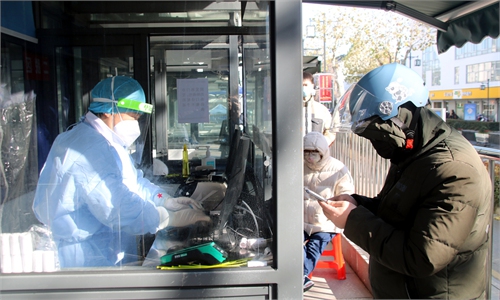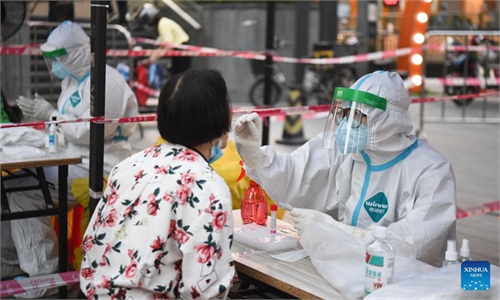
A medical worker takes a swab sample from a resident for nucleic acid test at a community in Liwan district of Guangzhou, South China's Guangdong province. Photo: Xinhua
Hospitals in many provinces in China have announced that their nucleic acid testing services will no longer be available to the general public without a medical need, which is seen as another step in a recent series of epidemic prevention and control policy optimization.
In recent days, many hospitals in various provincial-level regions including East China's Anhui, South China's Guangdong, Guangxi, Southwest China's Sichuan, Yunnan and North China's Tianjin, have announced that their nucleic acid testing sites will no longer be open to the public in order to reduce the risk of cross-contamination within the hospitals.
On Sunday, local authorities in Tianjin's Ninghe district announced that all medical facilities within the district would no longer be open for community-level personnel. People in need can go to the sampling sites set up on the streets for testing, according to the local authorities.
A number of hospitals in Bozhou, Anhui and Pubei, Guangxi also released similar messages. Some of these hospitals said that the suspension is to ensure that the nucleic acid testing crowd does not cross over with in-hospital personnel, in order to reduce the risk of cross-infection within the hospital.
A hospital in Shantou, Guangdong, moved a community-level nucleic acid testing site within its hospital to outside the hospital so that members of the public who needed testing would not have to enter the hospital.
This adjustment announced by the localities is considered another step in China's recent optimization of COVID-19 prevention and control measures.
At least a dozen cities across China further adjusted and optimized epidemic control measures over the weekend, including scrapping the requirement for frequent mass nucleic acid testing and mandatory COVID-19 test results for taking public transportation. Some cities such as Zhuhai in Guangdong and Southwest China's Chongqing urged local residents not to take nucleic acid tests unless necessary, while other places explored new measures such as allowing some people who test positive for COVID-19 to quarantine at home.


